习语的翻译方法2
习语翻译(英汉)

的想法是正确的。
2. Like knows like.
三、习语的翻译方法
由于习语具有以上的
三 特点,翻译时就尽量保
习 语
持这些特点。这就要求
的 译者不仅要忠实表达原
翻 译
文习语的意义,还要尽
方 可能保持原文的丰富联
法 想,修辞效果以及民族
和地方特色。
习语不仅大量地出现在文 艺作品中和政治、科学论 文中,在口语中也会使用 一些习语,因此,习语的 翻译是一个非常重要的问 题,习语翻译的好坏对整 个译文的质量及听懂英语 口语都有直接的影响。
英语习语汉译主要有以下 三种方法:
1、直译法
三
这种方法是习语翻译的
习 很常用的一种方法。直译
语 (literal translation) 的字面
的 翻
意思就是“完全依照原文
译 翻译”。但直译法的运用,
方 法
必须遵循译文的语言规范,
1 不能引起错误的联想,要
尽可能地保留英语习语的
有时尽管汉语读者对 英语习语的比喻或典故 不太熟悉,但通过上下 文体现的西方民族色彩 或是政治色彩,可以使 汉语读者接受和理解, 而且经大量使用后,又 丰富了汉语语言。
三
英语习语大致可以分为
习 两类,一类是根据组成习
语 的
语的词汇字面意思而推知
翻 整个习语意义的,一类是
译 方
意义深奥或出自著名文学
法 作品,《圣经》,神话传
1 说或历史典故的。这两类
习语均可使用直译法。
例如 第一类中:
as easy as turning over one’s hand
a gentleman’s agreement A rolling stone gathers no
英语习语翻译方法

英语习语翻译方法英语翻译习语方法一:直译法纸老虎利用直译法后,英语翻译成paper tiger,在外国人看来明义而又传神,直至逐渐被英美接受留用。
作为英语翻译中的中国人,直译的代表作kung fu,也由于中国的世界影响力,早早成为正式的英美民族语言。
英语翻译习语方法二:同义习语借用法在英语翻译前后,两种语言无论内容形式,表达情感都存在部分习语存在类似的比喻。
在英语翻译时,我们往往直接借用,如walls have ears与隔墙有耳,虽存在差异,但字义巧妙吻合,令借用后的英语翻译相得益彰。
英语翻译习语方法三:意译法意译法能处理在英语翻译中无法直译与借用状况下的原稿,典型的落花流水一词,由于表示一败涂地之意,而被英语翻译为to bi shattered to pieces,便是如此。
英语翻译习语方法四:省略法汉语中存在着四字习语两两对偶的情形,一般的英语翻译处理法会让译文显得杂糅重复,此时,省略法就发挥了功效。
如街谈巷议一词,简单的意味street gossip即可,英语翻译前后虽省略了一个词义,但却完全正确自然。
英语翻译习语方法五:增加法有了省略法,自有增加法。
在英语翻译中,汉语往往简略后能让国人明义,而英语则必须要增加说明,顺合外国人对英语翻译的习惯。
如树倒猢狲散译为Once the tree falls, the monkeys on it will flee helter-skelter中的helter-skelter便是利用增加法,起到调和英语翻译的作用。
2翻译英文文章技巧拿到一篇英文,首先要略读一下,来确定文章风格。
如果是抒情式的必须要将文章翻译得优美一些。
如果是科技文章,则语言必须要偏向专业和精简风格。
要多读相关材料来熟悉所写的内容。
一篇文章都会有自身的主题,要围绕主题多读一些相关的文章,这样在翻译当中才会使用更加合适的词汇、语句。
要注意英语单词对应的语义。
英语单词在翻译成汉语会有不同的意思。
英语习语的翻译
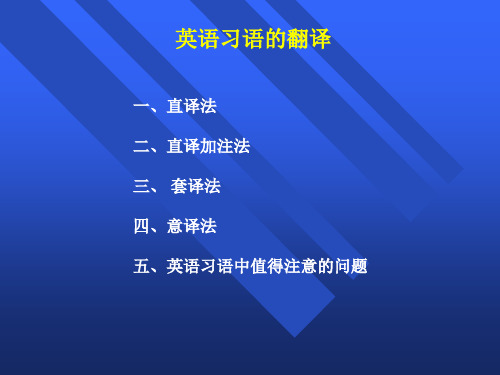
To wash one’s hand
“金盆洗手” 或 “洗手不干” 错! “推卸责任” 或 “断绝关系” 对!
五、英语习语中值得注意的问题
4. 准确理解英语习语, 弄清褒贬之分
It’s an ill wind that blows nobody good “天下无绝对的坏事” 或 “有弊也有利” 看似贬义, 其实是褒义. Birds of a feather flock together “物以类聚” “一丘之貉”
软硬兼施 赚钱养家 糊口 奉承,恭维
小菜一碟
精力充沛
be in apple-pie appleorder Butter would not melt in her mouth. One man’s meat is another man’s poison.
井井有条
装得清白无辜 一本正经
后悔已晚 与某人 有争论 插手, 干预
Hang on somebody’s sleeve To rain cats and dogs Hit the nail on the head A fly on the wheel
To miss the 依赖某人 boat 任某人做主
下倾盆 大雨
In a pig’s eyes
说得中肯, To the tune of 说得中肯, 一语道破 自高自大 的人
扫兴的人 或东西 采取回避 政策
A soldier of fortune
兵痞
Have a bee in one’s bonnet ( 头饰) 头饰) Hang on somebody’s lops To have other fish to fry
胡思乱想
To soil the beans To work hand in glove with
习语翻译

汉语习语的翻译
1.同义习语借用法
• 意义和形象相同或相似的习语
• 随大流
• swim with the tide
• 绞尽脑汁
• to rack one’s brains
• 千钧一发
• hung by a thread
• 浑水摸鱼
• to fish in troubled water
• 君子协定
• gentlemen’s agreement
• 黄鼠狼给鸡拜年 —— 不怀好意
• A weasel wishing Happy New Year to a chicken – harboring no good intentions.
• 老虎吃天 —— 无从下口
• A tiger wanting to eat the sky – not knowing where to start.
• 葫芦里卖的什么药
come.
• 塞翁失马,焉知非福?• What’s at the back of it?
• a blessing in disguise
• 意义相同但形象不同的习语
• 胆小如鼠
• as timid as a hare
• 臭味相投
• Like draws to like
• 缘木求鱼
We’re not talking about the castle in the air – the donkey’s carrot. No, I mean something we’ve all shared.
Those who like to make a scene will never get advantage.
习语翻译 拟声词翻译
习语的翻译方法

1.To break the record 打破纪录 2.Paper tiger 纸老虎 3.lose face 丢脸 4.running dog 走狗
5.Time is money
时间就是金钱 6. Easy come easy go 来的容易去的快 7.The cold war 冷战 8.Blood is thicker than water 血浓于水 9.Golden age 黄金 时代
英汉两种语言都拥有丰富多彩的习语不同的民族由于人们对待事物的情感态度和语不同的民族由于人们对待事物的情感态度和社会相类似也就必然会产生一些具有相同的意义和修辞色彩完相类似也就必然会产生一些具有相同的意义和修辞色彩完社会经历经历全相同或大体相同的习语全相同或大体相同的习语?wallshaveears?隔墙有耳?tobeinthesameboat?同舟共济?oneboyisaboytwoboyshalfaboythreeboysnoboys
(五)注释法: 在英汉习语中有一些源于历史典故。如果 直译,则很难理解;如果意译,则不能保持原文的特色。为了 解决这两方面的问题,给译文加注释是一种有效的方法。
1.Apple of discord 不和的金苹果——引起仇恨争吵的祸根 2.Achilles‘ heel 阿喀琉斯的脚后跟——致命的弱点 3.Sour grapes 酸葡萄——相当于阿Q精神 4.Climb a tree to catch fish——a fruitless approach. 缘木求鱼
The end
很不自在
3.To break the ice 打破沉默 4.Born with a silver spoon in one’s mouth 生长在富贵之家
• • •
单元总结unit7-习语的翻译方法
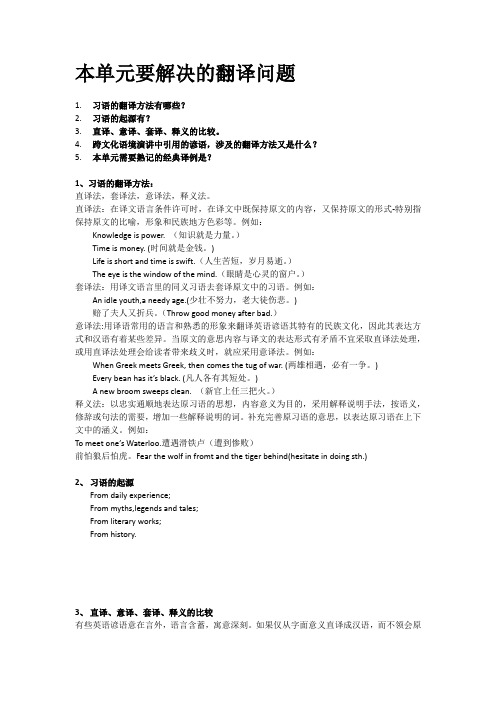
本单元要解决的翻译问题1.习语的翻译方法有哪些?2.习语的起源有?3.直译、意译、套译、释义的比较。
4.跨文化语境演讲中引用的谚语,涉及的翻译方法又是什么?5.本单元需要熟记的经典译例是?1、习语的翻译方法:直译法,套译法,意译法,释义法。
直译法:在译文语言条件许可时,在译文中既保持原文的内容,又保持原文的形式-特别指保持原文的比喻,形象和民族地方色彩等。
例如:Knowledge is power. (知识就是力量。
)Time is money. (时间就是金钱。
)Life is short and time is swift.(人生苦短,岁月易逝。
)The eye is the window of the mind.(眼睛是心灵的窗户。
)套译法:用译文语言里的同义习语去套译原文中的习语。
例如:An idle youth,a needy age.(少壮不努力,老大徒伤悲。
)赔了夫人又折兵。
(Throw good money after bad.)意译法:用译语常用的语言和熟悉的形象来翻译英语谚语其特有的民族文化,因此其表达方式和汉语有着某些差异。
当原文的意思内容与译文的表达形式有矛盾不宜采取直译法处理,或用直译法处理会给读者带来歧义时,就应采用意译法。
例如:When Greek meets Greek, then comes the tug of war. (两雄相遇,必有一争。
)Every bean has it’s black. (凡人各有其短处。
)A new broom sweeps clean. (新官上任三把火。
)释义法:以忠实通顺地表达原习语的思想,内容意义为目的,采用解释说明手法,按语义,修辞或句法的需要,增加一些解释说明的词。
补充完善原习语的意思,以表达原习语在上下文中的涵义。
例如:To meet one’s Waterloo.遭遇滑铁卢(遭到惨败)前怕狼后怕虎。
Fear the wolf in fromt and the tiger behind(hesitate in doing sth.)2、习语的起源From daily experience;From myths,legends and tales;From literary works;From history.3、直译、意译、套译、释义的比较有些英语谚语意在言外,语言含蓄,寓意深刻。
第18 课翻译难点--习语译法(2)
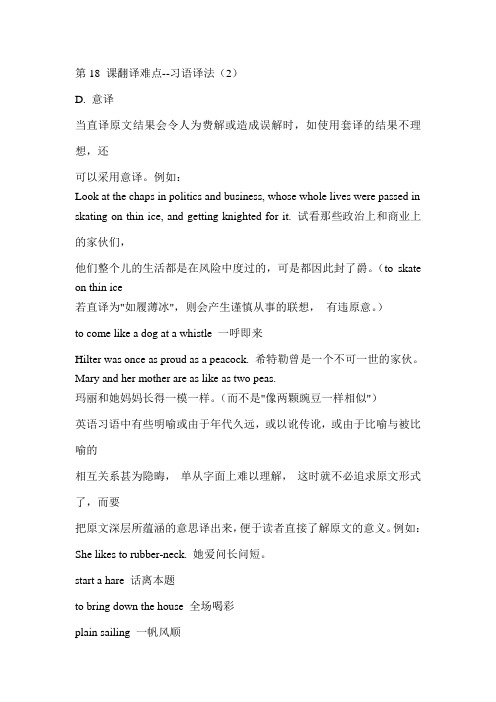
第18 课翻译难点--习语译法(2)D. 意译当直译原文结果会令人为费解或造成误解时,如使用套译的结果不理想,还可以采用意译。
例如:Look at the chaps in politics and business, whose whole lives were passed in skating on thin ice, and getting knighted for it. 试看那些政治上和商业上的家伙们,他们整个儿的生活都是在风险中度过的,可是都因此封了爵。
(to skate on thin ice若直译为"如履薄冰",则会产生谨慎从事的联想,有违原意。
)to come like a dog at a whistle 一呼即来Hilter was once as proud as a peacock. 希特勒曾是一个不可一世的家伙。
Mary and her mother are as like as two peas.玛丽和她妈妈长得一模一样。
(而不是"像两颗豌豆一样相似")英语习语中有些明喻或由于年代久远,或以讹传讹,或由于比喻与被比喻的相互关系甚为隐晦,单从字面上难以理解,这时就不必追求原文形式了,而要把原文深层所蕴涵的意思译出来,便于读者直接了解原文的意义。
例如:She likes to rubber-neck. 她爱问长问短。
start a hare 话离本题to bring down the house 全场喝彩plain sailing 一帆风顺to show one's clean heels 逃之夭夭to go on a wild goose chase 枉费心机as greedy as a wolf 贪得无厌Every bean has its black. 人皆有短处。
E.直译加意译这种译法既能保持原文的比喻形象,同时又能明白清楚地表达寓意。
习语的翻译方法2

Poor by condition, rich by ambition Where there is a will, there is a way It takes two to make a quarrel. As a man sows, so he shall reap. Don’t wash your dirty linen in public. To burn one’s boats A drop in the bucket More haste, less speed
Байду номын сангаас
Forbidden fruit is sweet. Out of sight, out of mind. No mill, no meal. Easy come, easy go. Half a loaf is better than no bread. If you run after two hares, you’ll catch neither.
3 宗教信仰
与宗教信仰有关的习语也大量出现在英汉语 言中。佛教传入中国已有一千多年的历史, 人们相信有“佛主”在左右着人间的一切, 与此有关的习语有很多,“借花献佛”、 “闲时不烧香,临时抱佛脚”等。在西方许 多国家,特别是英美,人们信奉基督教,相 关的习语如:God helps those who help themselves(上帝帮助自助的人),也有Go to hell (下地狱去)这样的诅咒。
As quiet as a lamb As rigid as a stone As sharp as a knife As small as a pin’s head As straight as an arrow As thick as a wall Quick like lightning No smoke without fire A stitch in time saves nine.
习语翻译

① 有眼不识泰山
② 有眼无珠
Tom, Dick and Harry ① 张三,李四,王二麻子 ② 阿猫阿狗 ③ 普通的人 / 任何人
Two heads are better than one. ① 三个臭皮匠赛过诸葛亮。 ② 人多出韩信。 ③两个脑袋总比一个脑袋强。
④ 两人智慧胜一人。/ 一人不及两人智。
eat ones words
误译 :食言;失信 原义:admit to having said something wrong 承认自己说错了话 child’s play 误译:儿戏 原义:thing that is very easy to do 容易做的事 touch-and-go 误译:一触即发 原义:uncertain as to the result 无法确定的结果
I Love You Enough!
“You don’t love me!” How many times have your kids laid that one on you? And how many times have you, as a parent, resisted the urge to tell them how much? Someday, when my children are old enough to understand the logic that motivates a mother, I’ll tell them. I loved you enough to bug you about where you were going, with whom, and what time you would go home. I loved you enough to say, “Yes, you can go to Disney World on Mother’s day. ” I loved you enough to let you see anger, disappointment ,disgust and tears in my eyes. I loved you enough not to make excuses for your lack of respect or your bad manners. I loved you enough to admit that I was wrong and ask your forgiveness. I loved you enough to ignore “what every other mother ”did or said. I loved you enough to let you stumble, fall, hurt and fail. I loved you enough to let you assume the responsibility for your own actions, at six, ten or sixteen. I loved you enough to figure you would lie about the party being chaperoned, but forgave you for it… after discovering I was right. I loved you enough to shove you off my lap, let go of your hand, be mute to your pleas… so that you had to stand alone. I loved you enough to accept you for what you are, not what I wanted you to be. But most of all, I loved you enough to say no when you hated me for it. That was the hardest part of all.
习语的翻译方法

习语的翻译方法语言之间的互相翻译不但有利于各国文化的交流,更有利于语言的发展。
在做翻译工作时最怕碰上习语多的文章。
为了忠于原著,译文心须既保持它的外国风味,又要符合本国文字的要求,而翻译习语却是最难把这两个标准一同达到的。
为了要适当地把外国语言中的习语翻译出来,有经验的翻译工作者一般采取下列几种方法:1.直译法----就是按照文字的字面意思直接翻译过来,例如汉语中的“纸老虎”直译成“paper tiger”,外国人看起来不但深明其义,而且觉得很是传神,所以现已成为正式的英美民族语言。
另外,我们口中的“丢脸”也被直译为“lose face”,“走狗”译成为“running dog”。
由于中国热而大为外国人欢迎的“功夫”音译成“kung fu”等也算是直译法的一种。
2.同义习语借用法——两种语言中有些同义习语无论在内容、形式和色彩上都有相符合,它们不但有相同的意思或隐义,面且有相同的或极相似的形象或比喻。
翻译时如果遇到这种情况不妨直载了当地互相借用。
比方说汉语中有一句习语是“隔墙有耳“,英语中却有”walls have ears”,两句话字、义两合,无懈可击。
我们说“火上加油”,英国人则说”to add fuel to the flame”,两者也完全一样。
3.意译法——有些习语无法直译,也无法找到同义的习语借用,则只好采用意译的方法来对待.例如汉语中的”落花流水”用来表示被打得大败之意,译成英文便是“to be shattered to pieces”。
“乌烟瘴气“形容情形混乱不堪,可用“chaos”来表达。
4.省略法—汉语中有一种情况,就是习语中有的是对偶词组,前后含意重复。
偶到这种情况时可用省略法来处理,以免产生画蛇添足之感。
例如“铜墙铁壁”可译成“wall of bronze”已经足够,实在无须说成“wall of copper and iron”。
“街谈巷议”在意义上也是重复的,所以译成“street gossip”便可以了。
习语的翻译
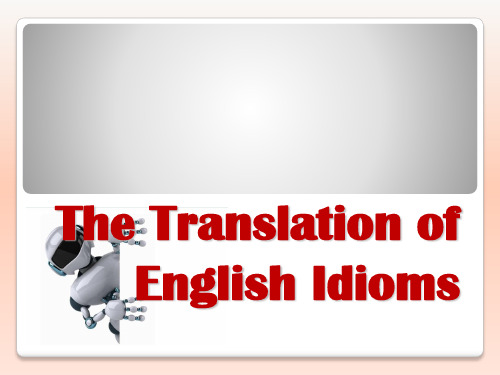
Conclus,即采用直译、释义、套译 和意译等方法使得译文不仅仅在字面上与原文对等, 在含义、褒贬作用、情感色彩等方面相当。 2.要懂得如何根据习语的特点灵活运用这些翻译技巧。 3.翻译时要越过社会文化差异的障碍,译出能使读者 产生与原文相同效果的译文。
习语在语言上具有精辟、生动、优美、形象、 通俗、寓意深刻等特点。因此,正确理解、确切 翻译英汉习语,对于我们学习和使用英语的人来 说是十分必要,也是必不可少的。
1.直译法 (Literal Translation)
直译法大致相当于异化译法 ,即不违背译文
语言规范,不引起错误联想,能保持英语习语的
Practice makes perfect. 熟能生巧。
Seeing is believing. 眼见为实。
Diamond cut diamond. 强中更有强中手。
Give him an inch and he’ll take an ell. 得寸进尺。 A lame traveler should get out bedtimes. 笨鸟先飞。 Beauty is in the eye of the beholder. 情人眼里出西施。 He spent money like water. 他花钱如流水似的。 An idle youth,a needy age. 少壮不努力,老大徒伤悲。 While there is life, there is hope. 留得青山在,不怕没柴烧。
4.意译法 (Free Translation)
意译法就是忠实于原文的内容,又不拘泥于 原文的形式而采用的按原文意思翻译的一种译法。 意译法也属于归化译法。 英语中有些习语无法直译或直译后使人无法 理解,在汉语中又找不到同义对等的习语套译, 也不能再现英语的表达形式,这时只有放弃原文 习语的形象和风格,根据上下文,灵活地传达原 作的内容。
俗语翻译法
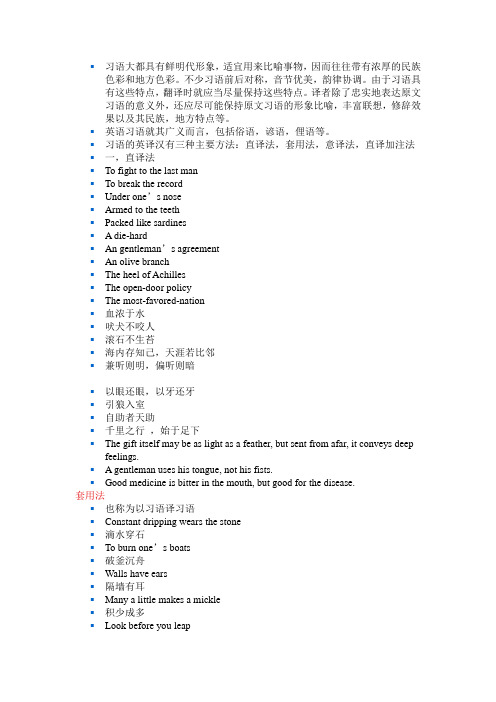
▪习语大都具有鲜明代形象,适宜用来比喻事物,因而往往带有浓厚的民族色彩和地方色彩。
不少习语前后对称,音节优美,韵律协调。
由于习语具有这些特点,翻译时就应当尽量保持这些特点。
译者除了忠实地表达原文习语的意义外,还应尽可能保持原文习语的形象比喻,丰富联想,修辞效果以及其民族,地方特点等。
▪英语习语就其广义而言,包括俗语,谚语,俚语等。
▪习语的英译汉有三种主要方法:直译法,套用法,意译法,直译加注法▪一,直译法▪To fight to the last man▪To break the record▪Under one’s nose▪Armed to the teeth▪Packed like sardines▪ A die-hard▪An gentleman’s agreement▪An olive branch▪The heel of Achilles▪The open-door policy▪The most-favored-nation▪血浓于水▪吠犬不咬人▪滚石不生苔▪海内存知己,天涯若比邻▪兼听则明,偏听则暗▪以眼还眼,以牙还牙▪引狼入室▪自助者天助▪千里之行,始于足下▪The gift itself may be as light as a feather, but sent from afar, it conveys deep feelings.▪ A gentleman uses his tongue, not his fists.▪Good medicine is bitter in the mouth, but good for the disease.套用法▪也称为以习语译习语▪Constant dripping wears the stone▪滴水穿石▪To burn one’s boats▪破釜沉舟▪Walls have ears▪隔墙有耳▪Many a little makes a mickle▪积少成多▪Look before you leap▪三思而后行▪There is no smoke without fire▪无风不起浪▪谋事在人,成事在天▪The burnt child dreads the fire▪一朝被蛇咬,十年怕草绳▪Better be the head of a dog than the tail of a lion▪宁为鸡头,勿为牛尾▪Where there’s a will, there’s a way▪有志者,事竟成▪杀机取卵▪To kill the goose that lays golden eggs▪成热打铁▪缘木求鱼▪To fish in the air▪Don’t wash your dirty linen in public▪家丑不可外扬▪ A fall into the pit, a gain in your wit▪吃一堑,长一智▪Hungry dogs will eat dirty puddings▪饥不择食▪Some idioms which exhibit strong national or cultural characteristics can neither be handled by borrowing idioms from the target language nortranslated literally because it would cause misunderstanding or could not be easily accepted by native speakers of the other language. In this case, it is necessary to resort to paraphrasing according to the context.▪To be going from bad to worse; to be deteriorating.▪To know practically nothing about▪What’s done is done, and cannot be undone.▪Regardless of the consequences▪To be simply nothing compared to▪In a turmoil; to be extremely upset▪ A fly on the wheel▪ A bull in a china shop▪(an area) flowing with milk and honey▪By hook or crook▪To carry fire in one hand and water in the other hand▪Every dog had its day▪This approach is used when certain idioms, particularly those with historical stories or names involved, can hardly be understood and accepted by the listener, and the translator cannot find their proper equivalents in the target language. If literal translation were used, they would lose their originalvividness.▪杀鸡给猴看▪To kill the chicken to frighten the monkey–to punish somebody as a warning to others.▪班门弄斧▪To show off one’s skill with the axe before Lu Ban the master carpenter-to display one’s slight skill before an expert/▪To teach your grandma to such eggs▪To offer to teach fish to swim▪三个臭皮匠赛过诸葛亮▪Three cobblers with their wits combined surpass Zhu geLiang the mastermind-to heads are better than onePrinciples for translating idioms▪ 1. retain the vividness and forceful effect▪既往不咎▪Let bygones be bygones▪有钱能使鬼推磨▪Money makes the mare go; money talks▪The spirit is willing but the flesh is weak▪物以类聚,人以群分▪Birds of a feather flock together▪Once bitten, twice shy▪ 2. retain the image▪ A stitch in time saves nine▪Man proposes, God/Heaven disposes▪ A gentleman uses his tongue, not his fists▪ 3. achieve brevity▪The unexpected always happens▪Give him an inch and he will take an ell▪天网恢恢,疏而不漏▪Justice has long arms▪To have eyes but fail to see Taishan Mountain▪To entertain an angel unawares▪You can’t eat your words▪You can’t break your promise▪You are pulling my leg▪ A horse stumbles that has four legs▪He’s leading a dog’s life▪I am dead-beat today▪To take French leave▪ A stony heart▪At one’s fingertips▪To have a hand like a foot▪As mute as a fish▪To return good for evil▪To shut one’s eyes against▪To talk black into white▪To turn a deaf ear to▪Practice makes perfect▪To face the music▪Plain sailing▪To be dead drunk▪Laugh and grow fat▪To fly into a rage▪To look for a needle in a haystack▪ A leap in the dark▪To show one’s colors▪To make a noise in the world▪More haste, less speed▪Neither fish nor flesh▪To pick holes in▪To mind one’s P’s and Q’s▪To be at the end of one’s rope▪To flog a dead horse▪To turn over a new leaf▪To put all one’s eggs in one basket▪He just had forty winks.▪His wife held the purse string.▪You should keep your nose out of here.▪That night he slept like a top, and woke with his knee of almost normal size.▪I am not talking about castles in the air-the donkey’s carrot.▪Mother said, “John, you’re talking through your hat. You’re craze”.▪His accent gave him away.▪The Nazis in Berlin became desperate and tried to make hell while the sun was shining.▪As blind as a bat▪As cool as a cucumber▪Between the devil and the blue sea▪To call a spade a spade▪Now or never▪Much cry and little wool▪With tongue in cheek▪To wear one’s heart on one’s sleeve▪The leopard cannot change its spots▪As the touchstone tries gold, so gold tires men.▪The proof of pudding is in the eating▪One cannot make a silk purse out of a sow’s ear.▪Do not count your chickens before they are hatched.▪The mills of God grind slowly.▪He laughs best who laughs last.▪Nothing venture, nothing gain.▪Fish begins to stink at the head.▪Speech is silver, silence is gold.▪远亲不如近邻▪Neighbors are dearer than distant relatives/▪Neighbors are more helpful than relatives/▪ a remote kinsfolk is not as good as a near neighbor▪情人眼里出西施▪Beauty is in the eyes of the beholder/▪love sees no fault/▪Love blinds a man to imperfections▪有缘千里来相会,无缘对面不相逢▪Those who are meant to meet will meet even if they are separated by a thousand miles; those who are not meant to meet will not get acquainted even if they brush shoulders with one another.▪醉翁之意不在酒▪Many kiss the baby for the nurse’s sake▪The drinker’s heart is not in his cup-he has something else in his mind.▪天有不测风云,人有旦夕祸福▪Storms gather without warning in nature, and bad luck befalls men overnight.▪The weather and human life are both unpredictable。
英汉汉英翻译教程第十章 习语的翻译

10.5 折中译法 10.6 略译法、补译法、直 译加注法 10.7 不含文化意象的习语
一、折中译法
中英文化差异导致语言表达上的悬 殊,是的许多习语无法使用异化或归化 译法进行翻译,勉强使用的话,只会产 生风格不符和意义扭曲等问题,读者无 法理解和接受。在这种情况下只好退而 求其次,使用折中译法,化去原文中的 意象,译出其核心意义,这种译法文珊
高志娟
陈春柳
• 牛海绵状脑病(Bovine spongiform encephalopathy,简称BSE),俗称疯牛 病(mad cow disease),是由传染因子引 起的牛的一种进行性神经系统的传染性疾 病,是一种传染性海绵状脑病。该病的主 要特征是牛脑发生海绵状病变,并伴随大 脑功能退化,临床表现为神经错乱、运动 失调、痴呆和死亡。
• 4.Even before they were acquainted, he had admired Osborn in secret. Now he was his valet, his dog, his man Friday. • 他没有认识奥斯本之前,已经暗暗佩服他。 如今便成了他的听差,他的狗,他的忠仆 星期五。 • 星期五(Friday)是《鲁滨逊漂流记》故事 中Robinson Crusoe的忠实奴仆。
Examples:
• 1.“三十六计,走为上计”应译为 The best stratagem is to quit, 因为英美人不 知道中国古代兵法有著名的“三十六计”, 如果译成Of the thirty-six stratagems, the best is to quit,英美读者可能会纠缠在thirtysix这个数字上,造成误解。 • 2.“一朝一夕”译为overnight
英汉翻译技巧
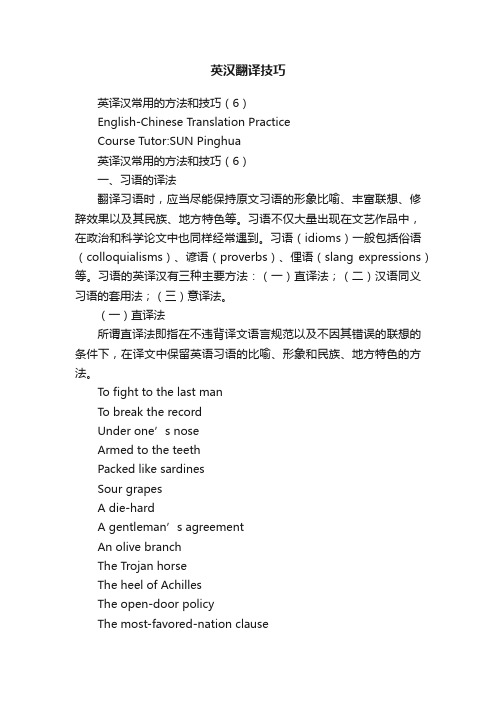
英汉翻译技巧英译汉常用的方法和技巧(6)English-Chinese Translation PracticeCourse Tutor:SUN Pinghua英译汉常用的方法和技巧(6)一、习语的译法翻译习语时,应当尽能保持原文习语的形象比喻、丰富联想、修辞效果以及其民族、地方特色等。
习语不仅大量出现在文艺作品中,在政治和科学论文中也同样经常遇到。
习语(idioms)一般包括俗语(colloquialisms)、谚语(proverbs)、俚语(slang expressions)等。
习语的英译汉有三种主要方法:(一)直译法;(二)汉语同义习语的套用法;(三)意译法。
(一)直译法所谓直译法即指在不违背译文语言规范以及不因其错误的联想的条件下,在译文中保留英语习语的比喻、形象和民族、地方特色的方法。
To fight to the last manTo break the recordUnder one’s noseArmed to the teethPacked like sardinesSour grapesA die-hardA gentleman’s agreementAn olive branchThe Trojan horseThe heel of AchillesThe open-door policyThe most-favored-nation clauseThe position-of-strength policyShuttle diplomacyThe cold warA cat has nine livesBlood is thicker than waterBarking dogs do not biteA rolling stone gathers no moss战斗到最后一个人打破记录在某人鼻子底下武装到牙齿挤得象罐头沙丁鱼酸葡萄死硬派君子协定橄榄树枝特洛伊木马阿基里斯的脚踵悬挂在达摩克里斯头顶上的剑门户开放政策最惠国条款实力地位政策穿梭外交冷战热战猫有九命血浓于水吠犬不咬人滚石不生苔(二)汉语同义习语的套用法有的英语习语和汉语同义习语在内容和形式上都相符合,双方不但有相同的意义和修辞色彩,并且有相同的或大体相同的形象比喻。
习语的六种翻译方法
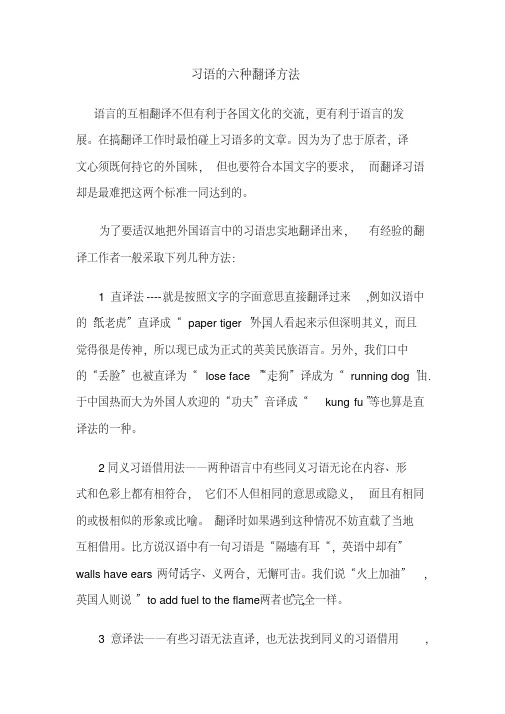
习语的六种翻译方法语言的互相翻译不但有利于各国文化的交流,更有利于语言的发展。
在搞翻译工作时最怕碰上习语多的文章。
因为为了忠于原者,译文心须既何持它的外国味,但也要符合本国文字的要求,而翻译习语却是最难把这两个标准一同达到的。
为了要适汉地把外国语言中的习语忠实地翻译出来,有经验的翻译工作者一般采取下列几种方法:1直译法----就是按照文字的字面意思直接翻译过来,例如汉语中外国人看起来示但深明其义,而且的“纸老虎”直译成“paper tiger”,觉得很是传神,所以现已成为正式的英美民族语言。
另外,我们口中由“走狗”译成为“running dog”.的“丢脸”也被直译为“lose face”,于中国热而大为外国人欢迎的“功夫”音译成“kung fu”等也算是直译法的一种。
2同义习语借用法——两种语言中有些同义习语无论在内容、形式和色彩上都有相符合,它们不人但相同的意思或隐义,面且有相同的或极相似的形象或比喻。
翻译时如果遇到这种情况不妨直载了当地互相借用。
比方说汉语中有一句习语是“隔墙有耳“,英语中却有”两句话字、义两合,无懈可击。
我们说“火上加油”,walls have ears”,两者也完全一样。
英国人则说”to add fuel to the flame”,3意译法——有些习语无法直译,也无法找到同义的习语借用,则只好采用意译的方法来对待.例如汉语中的”落花流水”用来表示被。
“乌烟瘴气“形打得大败之意,译成英文便是“to bi shattered to pieces”容情形混乱不堪,可用“chaos”来表达。
4省略法—汉语中有一种情况,就是习语中有的是对偶词不达意组,前后含意重复。
偶到这种情况时可用省略法来处理,以免产生画蛇添足之感。
例如“铜墙铁壁”可译成“wall of bronz l” 已经足够,街谈巷议“在意义上也是实在无须说成”wall pf klckopper and iron”.”便可以了。
习语翻译的方法
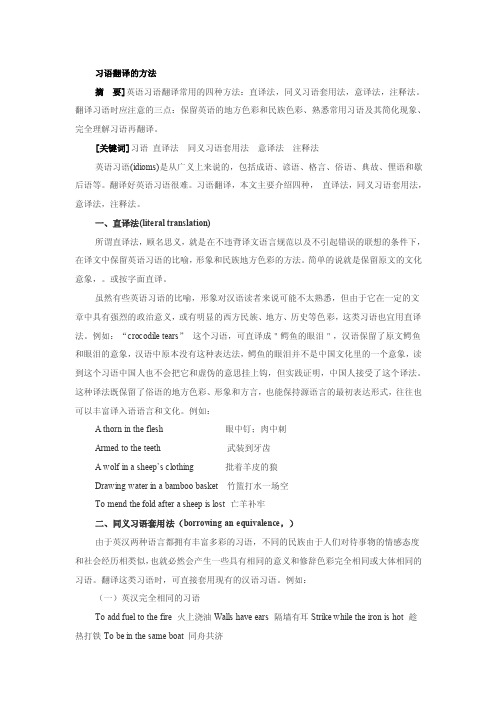
习语翻译的方法摘要]英语习语翻译常用的四种方法:直译法,同义习语套用法,意译法,注释法。
翻译习语时应注意的三点:保留英语的地方色彩和民族色彩、熟悉常用习语及其简化现象、完全理解习语再翻译。
[关键词]习语直译法同义习语套用法意译法注释法英语习语(idioms)是从广义上来说的,包括成语、谚语、格言、俗语、典故、俚语和歇后语等。
翻译好英语习语很难。
习语翻译,本文主要介绍四种,直译法,同义习语套用法,意译法,注释法。
一、直译法(literal translation)所谓直译法,顾名思义,就是在不违背译文语言规范以及不引起错误的联想的条件下,在译文中保留英语习语的比喻,形象和民族地方色彩的方法。
简单的说就是保留原文的文化意象,。
或按字面直译。
虽然有些英语习语的比喻,形象对汉语读者来说可能不太熟悉,但由于它在一定的文章中具有强烈的政治意义,或有明显的西方民族、地方、历史等色彩,这类习语也宜用直译法。
例如:“crocodile tears”这个习语,可直译成"鳄鱼的眼泪",汉语保留了原文鳄鱼和眼泪的意象,汉语中原本没有这种表达法,鳄鱼的眼泪并不是中国文化里的一个意象,读到这个习语中国人也不会把它和虚伪的意思挂上钩,但实践证明,中国人接受了这个译法。
这种译法既保留了俗语的地方色彩、形象和方言,也能保持源语言的最初表达形式,往往也可以丰富译入语语言和文化。
例如:A thorn in the flesh 眼中钉;肉中刺Armed to the teeth 武装到牙齿A wolf in a sheep’s clothing 批着羊皮的狼Drawing water in a bamboo basket 竹篮打水一场空To mend the fold after a sheep is lost 亡羊补牢二、同义习语套用法(borrowing an equivalence,)由于英汉两种语言都拥有丰富多彩的习语,不同的民族由于人们对待事物的情感态度和社会经历相类似,也就必然会产生一些具有相同的意义和修辞色彩完全相同或大体相同的习语。
英语习语的翻译
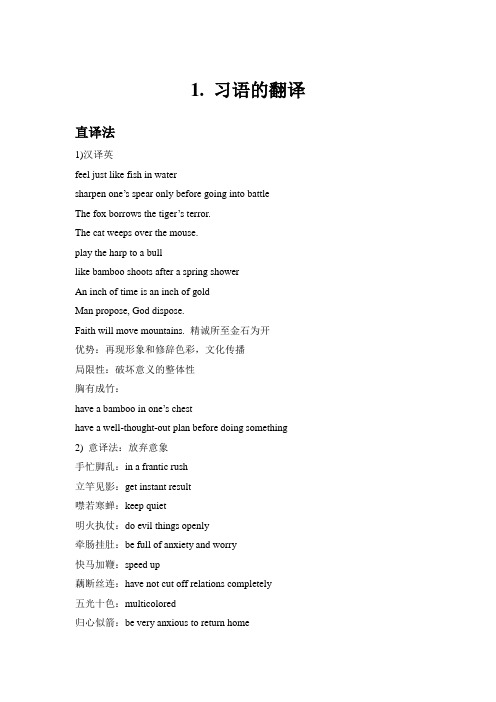
1. 习语的翻译直译法1)汉译英feel just like fish in watersharpen one’s spear only before going into battleThe fox borrows the tiger’s terror.The cat weeps over the mouse.play the harp to a bulllike bamboo shoots after a spring showerAn inch of time is an inch of goldMan propose, God dispose.Faith will move mountains. 精诚所至金石为开优势:再现形象和修辞色彩,文化传播局限性:破坏意义的整体性胸有成竹:have a bamboo in one’s chesthave a well-thought-out plan before doing something 2) 意译法:放弃意象手忙脚乱:in a frantic rush立竿见影:get instant result噤若寒蝉:keep quiet明火执仗:do evil things openly牵肠挂肚:be full of anxiety and worry快马加鞭:speed up藕断丝连:have not cut off relations completely五光十色:multicolored归心似箭:be very anxious to return home鸡毛蒜皮:trifling开门见山:come directly to the point狗急跳墙:do something desperate黔驴技穷:at one’s wit’s end单枪匹马:all by oneself生龙活虎:bursting with energy顺手牵羊:walk off with something守株待兔:trust to chance and stroke of luck 3) 套译法字面意义和蕴含意义基本一致:肉中刺:a thorn in the flesh浑水摸鱼:fish in troubled water趁热打铁:Strike while the iron is hot隔墙有耳:Walls have ears自投罗网:throw oneself into the trap嗤之以鼻:turn up one’s nose at一触即发:touch and go空中楼阁:castles in the air充耳不闻:turn a deaf ear to破釜沉舟:burn one’s boat晴天霹雳:a bolt from the blue熟能生巧:Practice makes perfect事实胜于雄辩:Facts speak louder than words 意象差异、喻意基本一致:laugh one’s head off 笑掉大牙at sixes and sevens 乱七八糟look right and left 东张西望throw a sprat to catch a herring 抛砖引玉seek a hare in hen’s nest 缘木求鱼spend money like water 挥金如土as timid as a hare 胆小如鼠like a rat in a hole 瓮中捉鳖Homer sometimes nods. 智者千虑,必有一失Birds of a feather flock together. 物以类聚,人以群分There is no smoke without fire. 无风不起浪Cry up wine and sell vinegar. 挂羊头卖狗肉New brooms sweep clean. 新官上任三把火Go for wool and come back shorn. 偷鸡不成蚀把米Do as you would be done by. 己所不欲,勿施于人Diamond like diamond.4) Back translation:an eye for an eyea gentleman’s agreementarmed to the teeth5) 加注法Show one’s proficiency with an axe before Lu Ban, the master carpenter. 喻意比文化蕴含更重要时,放弃意象,概括喻意望梅止渴,画饼充饥:fantasy or an illusion。
习语的翻译

• • • • • • • • • •
To make a beast of oneself 形同禽兽 He that has been bitten by a serpent is afraid of a rope. 一朝被蛇咬,十年怕草绳。 Shallow streams make most din. 水深不响, 水响不深。 Money makes the mare go. 有钱能使鬼推磨。 Reckless youth makes rueful age. 少壮不努力,老大徒伤悲。
B. 习语形义基本相同, 这类习语比上 面一类在数量上要多些,例如:
• • • • • as light as a feather(or as thistle-down) 轻如鸿毛 to take a load off one’s mind 如释重负 to run in the same groove; to cut from the same cloth. • 如出一辙 •
D.英汉习语形异义似, 例如:
• • • • • • • A word spoken is past recalling. 一言既出,驷马难追。 Great boast, small roast. 干打雷, 不下雨。 Take not a musket to kill a butterfly. 杀鸡焉用宰牛刀。
• as lean as a rail • 骨瘦如柴 (如 直译为"瘦得像个横杆",则不符 合中国人习惯。) • clean hand • 两袖清风 • It was by no means a bed of rose. • 这决不是安乐窝。 • He cries wine and sells vinegar. • 挂羊头,卖狗肉。 • as pale (or white) as ashes • ( or sheet or death) 面如土色 •
论习语的翻译
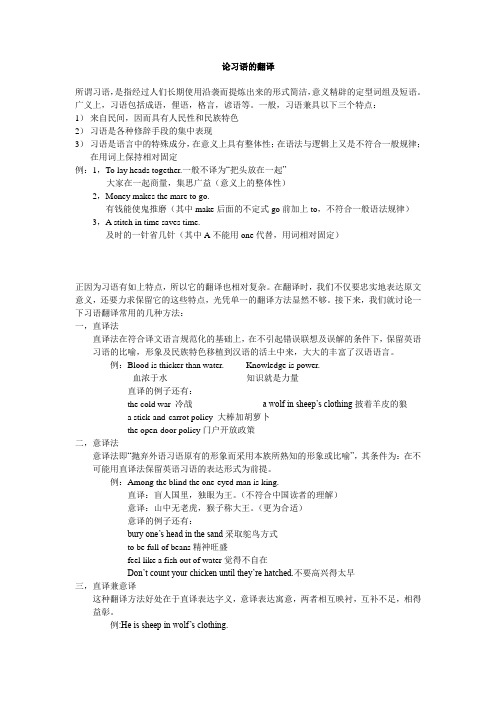
论习语的翻译所谓习语,是指经过人们长期使用沿袭而提炼出来的形式简洁,意义精辟的定型词组及短语。
广义上,习语包括成语,俚语,格言,谚语等。
一般,习语兼具以下三个特点:1)来自民间,因而具有人民性和民族特色2)习语是各种修辞手段的集中表现3)习语是语言中的特殊成分,在意义上具有整体性;在语法与逻辑上又是不符合一般规律;在用词上保持相对固定例:1,To lay heads together.一般不译为“把头放在一起”大家在一起商量,集思广益(意义上的整体性)2,Money makes the mare to go.有钱能使鬼推磨(其中make后面的不定式go前加上to,不符合一般语法规律)3,A stitch in time saves time.及时的一针省几针(其中A不能用one代替,用词相对固定)正因为习语有如上特点,所以它的翻译也相对复杂。
在翻译时,我们不仅要忠实地表达原文意义,还要力求保留它的这些特点,光凭单一的翻译方法显然不够。
接下来,我们就讨论一下习语翻译常用的几种方法:一,直译法直译法在符合译文语言规范化的基础上,在不引起错误联想及误解的条件下,保留英语习语的比喻,形象及民族特色移植到汉语的活土中来,大大的丰富了汉语语言。
例:Blood is thicker than water. Knowledge is power.血浓于水知识就是力量直译的例子还有:the cold war 冷战 a wolf in sheep’s clothing披着羊皮的狼a stick-and-carrot policy 大棒加胡萝卜the open-door policy门户开放政策二,意译法意译法即“抛弃外语习语原有的形象而采用本族所熟知的形象或比喻”,其条件为:在不可能用直译法保留英语习语的表达形式为前提。
例:Among the blind the one-eyed man is king.直译:盲人国里,独眼为王。
- 1、下载文档前请自行甄别文档内容的完整性,平台不提供额外的编辑、内容补充、找答案等附加服务。
- 2、"仅部分预览"的文档,不可在线预览部分如存在完整性等问题,可反馈申请退款(可完整预览的文档不适用该条件!)。
- 3、如文档侵犯您的权益,请联系客服反馈,我们会尽快为您处理(人工客服工作时间:9:00-18:30)。
3 意译法
有时对英语习语中的形象不了解,而这个形象又不易或没必 要解释,那么就应该根据情况采取只翻译意义的方法。 A white elephant to carry coals to Newcastle A hundred to one, it will be a success. When Greek meets Greek, then comes the tug of war. Out of the frying-pan into the fire She is now between the devil and deep sea on this matter. Everyone has a fool in his sleeve. The matter was finally settled under the table. This testimony puts quite a new face on the whole matter.
Forbidden fruit is sweet. Out of sight, out of mind. No mill, no meal. Easy come, easy go. Half a loaf is better than no bread. If you run after two hares, you’ll catch neither.
习语的翻译
1 生存环境的差异 习语的产生与人们的劳动和生活密切相关。英国是 个岛国,历史上航海业曾一度领先世界;而汉民族 在亚洲大陆生活繁衍,人们的生活离不开土地。比 喻花钱浪费大手大脚,英语是spend money like water,而汉语是“挥金如土”。英语中有许多关于 船和水的习语,在汉语中没有完全形同的对应语, 如to rest on one’s oars(暂时歇一歇);to keep one’s head above water (奋力图存);all at sea (不知所措)。
4 历史典故
英汉两种语言还有大量由历史典故形成的习 语,这些习语结构简单、意义深远,往往是 不能单从字面意义去理解和翻译的。如“东 施效颦”。英语典故习语多来自《圣经》和 希腊罗马神话,如Achilles’ heel(唯一致命 的弱点),meet one’s waterloo(一败涂地), Penelope’s web(永远完不成的工作),a Pandora’s box(潘多拉之盒,即灾难、麻烦、 祸害的根源)等。
2 习俗的差异
英汉习俗的差异是多方面的,最典型的莫过于在对狗这种动 物的态度上。狗在汉语里是一种卑微的动物,汉语中与狗有 关的习语大都含有贬义:狐朋狗党、狗急跳墙、狼心狗肺、 狗腿子等。而在西方国家,狗被认为是人类最忠诚的朋友。 英语中有关狗的习语大部分没有贬义,常以狗的形象来比喻 人的行为:You are a luck dog.(你是幸运儿),Every dog has his day.(凡人皆有得意日),Old dog will not learn new tricks.(老人学不了新东西)等。形容人病得厉害用: as sick as a dog,累极了用dog-tired。与此相反,中国人十 分喜爱猫,用“馋猫”比喻人贪嘴,常有亲昵成分,而在西 方文化中,猫用来比喻“包藏祸心的女人”。
4 替换法
As blind as a bat As timid as a hare On pins and needles To wake up a sleeping dog To beat the dog before the lion Lock the door after the horse is stolen. He who take the charge knows the responsibility.
To kill the goose that lays the golden eggs. She always throws her cares to the winds. He is shooting off his mouth. He does not know the first thing of economy. To make a mountain out of the molehill. To throw one’s weight about To turn over a new leaf To be wet behind the ears
As quiet as a lamb As rigid as a stone As sharp as a knife As small as a pin’s head As straight as an arrow As thick as a wall Quick like lightning No smoke without fire A stitch in time saves nine.
3 宗教信仰
与宗教信仰有关的习语也大量出现在英汉语 言中。佛教传入中国已有一千多年的历史, 人们相信有“佛主”在左右着人间的一切, 与此有关的习语有很多,“借花献佛”、 “闲时不烧香,临时抱佛脚”等。在西方许 多国家,特别是英美,人们信奉基督教,相 关的习语如:God helps those who help themselves(上帝帮助自助的人),也有Go to hell (下地狱去)这样的诅咒。
谚语及经典牛句
1 The cow that’s first up gets the first of the dew. 2 Cows that feed on the grass and chickens live on grain; everyone has his own bliss. 3 Calf love, half love; old love, cold love. 4 He that steals an egg will steal an ox. 5 Many good cows have evil calves.
典故
Bull market;牛市 Bull market也作bullish market,也称多头市场,指 证券市场买入者多于卖出者,行情普遍看涨,延续 时间较长的大升市。牛市的来历离不开熊市(bear market)。所谓熊市也指空头市场,指行情普遍看 淡,延续时间相对较大的大跌市。熊市的典故来自 于一个古老的故事,指一个人没有抓到熊就想卖掉 熊皮。在股市中指卖掉股票,以期在价格更低时在 买入,以谋求利润。
习语
1 Holly cow 2 milk cow 3 shoot the bull 4 throw the bulls 5 an old cow licking her calf 6 a bull in a china shop 7 like a bull at a (five-barred) gate
习语的翻译方法
翻译习语的标准首先是传达本意,其次是尽量保留文化特色 和语言特色,所以根据具体情况,习语的翻译大致有以下几 种: 1 等值译法 英语中有些习语和汉语的表达方法完全或者基本相同,这个 时侯照译即可。如: As cold as ice 冰冷 To fish for praise 沽名钓誉 To strike while the iron is hot 趁热打铁 Knowledge is power. 知识就是力量。 Through fire and flood 赴汤蹈火
To jump out of one’s skin To kick down the ladder After one’s heart To fish in the air To reap what one has sown He that sows the wind will reap the whirlwind.
6 You can’t sell the cow and drink the milk. 7 If the ox falls, whet your knife. 8 An ox is taken by the horn, and the man by his tongue. 9 The black ox has trod on his foot. 10 Horses jaws do not match cows’ head.
8 bull of the woods 9 milk the bull 10 take the bull by the horns 11 get into the tip of a bull’s horn 12 Irish bull 13 a cock-and-bull story
值得注意的是,因为动物词汇的联想含义的不同, 很多汉、英有关牛的词语往往找不到一致的表达, 常常用其他动物的词汇来转义。 牛脾气 过牛马不如的生活 对牛弹琴 牛饮 牛不喝水强按头 直ion, rich by ambition Where there is a will, there is a way It takes two to make a quarrel. As a man sows, so he shall reap. Don’t wash your dirty linen in public. To burn one’s boats A drop in the bucket More haste, less speed
Castle in the air 空中楼阁 A bolt from the blue 晴天霹雳 To hang by a hair 千钧一发 To show the cloven hook 露马脚 Who has never tasted bitter, knows not what is sweet不知苦中苦,难得甜上甜。
1 常见知识点
